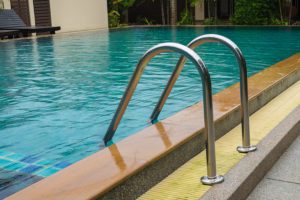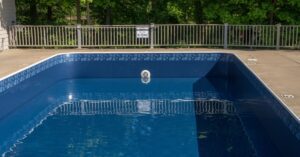

The first thing you need to know is that algae spores are everywhere and can enter your pool thanks to rain or a strong wind. The algae spores will then grow and eat the organic debris that blows into your pool, including fallen leaves and grass cuttings, and pool chemistry is all about making sure there’s too much chlorine in the water for algae to survive.
Heavy rain not only adds a lot more algae spores to your pool, it also adds a lot more water to the pool and disrupts the chemical balance. That’s why many pools turn green or black with algae after a heavy rain, but there are things you can do to prepare for a heavy rain ahead of time.
- Shut down power and gas lines near your pool. Bad things happen when electricity and water meet, so turn off the power leading to your pool since running the pump is mostly pointless during a downpour anyway. Just don’t forget to turn it back on afterwards. You should also keep the exterior gas lines shut when you aren’t using them no matter what, but if you have a natural gas pool heater you should shut that line before a storm, too.
- Clear the patio. Patio furniture tends to be water resistant, but it also tends to be light enough for a strong wind to blow it into the pool. Make sure you store everything you can indoors before the rain hits so you won’t have to fish it out of the pool later. Don’t forget to cover the pool pump and heater, too.
- Balance the chemistry. You shouldn’t add extra chlorine because you can never be certain how much rain will fall and dilute the water in your pool, but making sure the chemistry is perfect just before and just after a storm can go a long way to preventing an algae bloom. And while the pool’s overflow drains will keep it level, you might consider dropping the water level by up to a foot so the rain is less likely to overwhelm the overflow.
A major storm can cause all kinds of damage to an aging house, and if you can you should find the problems before they flood your house and not after. And while your pool might not be as big a priority as water in your basement, preparing it for a storm will make sure an overflowing pool full of algae doesn’t add to your problems.



